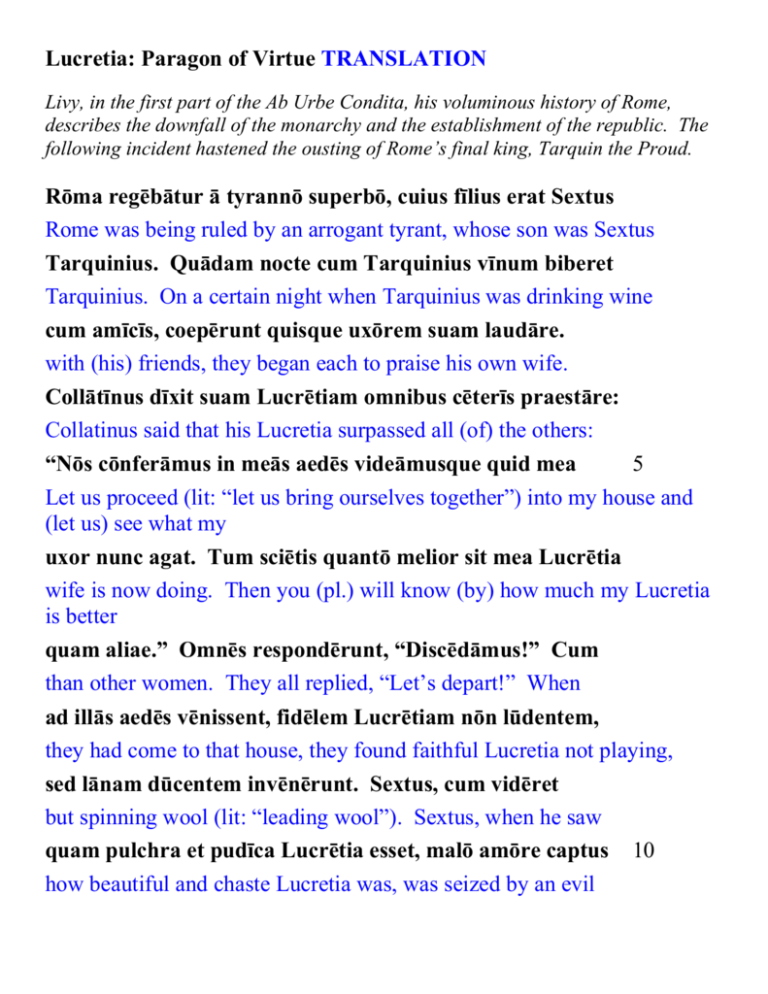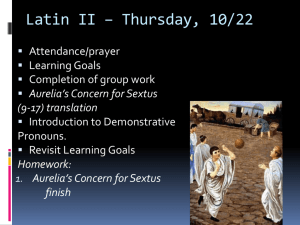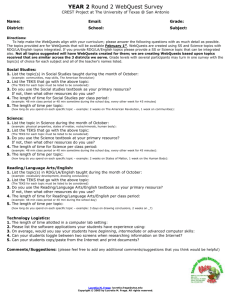Lucretia: Paragon of Virtue TRANSLATION Livy, in
advertisement

Lucretia: Paragon of Virtue TRANSLATION Livy, in the first part of the Ab Urbe Condita, his voluminous history of Rome, describes the downfall of the monarchy and the establishment of the republic. The following incident hastened the ousting of Rome’s final king, Tarquin the Proud. Rōma regēbātur ā tyrannō superbō, cuius fīlius erat Sextus Rome was being ruled by an arrogant tyrant, whose son was Sextus Tarquinius. Quādam nocte cum Tarquinius vīnum biberet Tarquinius. On a certain night when Tarquinius was drinking wine cum amīcīs, coepērunt quisque uxōrem suam laudāre. with (his) friends, they began each to praise his own wife. Collātīnus dīxit suam Lucrētiam omnibus cēterīs praestāre: Collatinus said that his Lucretia surpassed all (of) the others: “Nōs cōnferāmus in meās aedēs videāmusque quid mea 5 Let us proceed (lit: “let us bring ourselves together”) into my house and (let us) see what my uxor nunc agat. Tum sciētis quantō melior sit mea Lucrētia wife is now doing. Then you (pl.) will know (by) how much my Lucretia is better quam aliae.” Omnēs respondērunt, “Discēdāmus!” Cum than other women. They all replied, “Let’s depart!” When ad illās aedēs vēnissent, fidēlem Lucrētiam nōn lūdentem, they had come to that house, they found faithful Lucretia not playing, sed lānam dūcentem invēnērunt. Sextus, cum vidēret but spinning wool (lit: “leading wool”). Sextus, when he saw quam pulchra et pudīca Lucrētia esset, malō amōre captus 10 how beautiful and chaste Lucretia was, was seized by an evil Lucretia: Paragon of Virtue TRANSLATION est. Paucīs diēbus post, cum abesset Collātīnus, iste revēnit. love. A few days later, when Collatinus was away, that man returned. Cum, cēnā oblātā, in hospitāle cubiculum ductus esset, ad When, after dinner had been offered, he had been led into a guest bedroom, he dormientem Lucrētiam vēnit: “Tacē!” inquit. “Sextus Tarcame to Lucretia while she was sleeping: “Be silent!” he said. “I am quinius sum; ferrum in manū ferō. Cēde mihi aut tē Sextus Tarquinius; I bear a sword in (my) hand. Yield to me or I will necābō!” Cum Lucrētia necārī mallet, dēnique tamen vīcit 15 kill you!” Although Lucretia preferred to be killed, nevertheless, Sextus Sextus eius pudīcitiam. Tum discessit. Sed Lucrētia omnia finally overcame her chastity. Then he left. But Lucretia told all (of) haec narrāvit Collātīnō, quī iūrāvit sē Sextum necātūrum these things to Collatinus, who swore that he would kill esse. Tum Lucrētia sē necāvit, nē aliīs uxōribus vidērētur Sextus. Then Lucretia killed herself, lest she seem to be (as a) bad example malō exemplō esse: “Ego mē culpā absolvō, sed poenā nōn to/for the other wives: “I free myself from blame, but I do not free (myself) līberō,” occidēns dīxit. 20 from the punishment,” she said as she died. - adapted from Livy, Ab Urbe Condita I.57.6-58.11 Lucretia: Paragon of Virtue TRANSLATION (The Rape of Lucretia, Titian, circa 1570-76)









